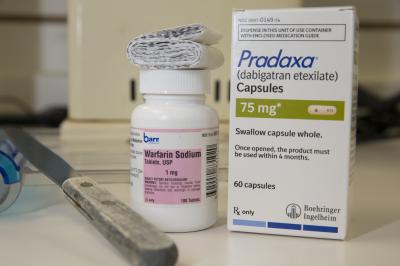
Credit: Tim Betler/UPMC
PITTSBURGH, Dec. 1, 2016 – In the first analysis of how to treat patients on anticoagulants who suffer a major bleeding event, a clinical practice that routinely gives doctors pause, while also evaluating a new drug, University of Pittsburgh researchers aim to provide much-needed guidance to clinicians trying to balance the risks of stroke versus bleeding when determining the best treatment.
The analysis, published today in the journal Stroke, determined that resuming anticoagulation therapy after a person suffers a major bleeding event was associated with a higher likelihood of stroke-free survival than discontinuing anticoagulation. Furthermore, restarting therapy with the new oral anticoagulant dabigatran was associated with a lower risk of recurrent hemorrhage in these cases than the old standby drug warfarin.
People take anticoagulants to avoid blood clots when they have a risk for stroke or heart attack, but the downside is that these medications increase a person's risk of severe bleeding–such as in the brain or gut–because the blood isn't clotting as well as it otherwise might.
"If a patient who is on an anticoagulant to avoid a stroke has a major bleeding event, doctors are faced with a catch-22: Discontinue the anticoagulant to avoid future bleeding, but again place their patient at increased risk of stroke; or resume the anticoagulant to continue avoiding a stroke, but then have to worry about another bleeding event," said lead author Inmaculada Hernandez, Pharm.D., Ph.D., an assistant professor in Pitt's School of Pharmacy, who completed this work as a doctoral student at Pitt's Graduate School of Public Health.
"It causes a lot of uncertainty for physicians, especially because patients at highest risk of recurrent bleeding also are at highest risk of stroke," said co-author Yuting Zhang, Ph.D., associate professor of health policy and management at Pitt Public Health, and Hernandez's doctoral dissertation committee chair.
The Pitt research team obtained data from 2010 to 2012 for a random sample of Medicare beneficiaries. They then followed nearly 90,000 people who had filled prescriptions for the anticoagulants warfarin, which has been used as a medication since 1954, and dabigatran, which was approved by the U.S. Food and Drug Administration in 2010. More than 1,500 of those people suffered a major bleeding event while using one of the drugs. About half of those people resumed one of the two anticoagulants a few months after the bleeding, while the others did not.
The risk of dying from any cause or having a stroke was 23 to 34 percent higher in patients who discontinued anticoagulation therapy compared to those who resumed it. People who took dabigatran after their initial bleeding event had nearly half the risk of another major bleeding event within one year compared with those who took warfarin.
"Our results should encourage clinicians to seriously consider resuming anticoagulation among patients who survived a major bleeding event, particularly if the source of bleeding was identified and addressed," said senior author Samir Saba, M.D., associate professor of medicine and associate chief of cardiology at UPMC Heart and Vascular Institute. "They should also take into account that the benefit-to-risk ratio of post-hemorrhage use of anticoagulation is not the same for all medications."
###
Additional authors on this research are Maria M. Brooks, Ph.D., of Pitt Public Health; and Paul K.L. Chin, Ph.D., of the University of Otago in New Zealand.
This research was funded by the Commonwealth Foundation, Agency for Healthcare Research and Quality grant R01 HS018657, and National Institute of Mental Health grant R21 MH100721. Dr. Hernandez was supported by a fellowship from "La Caixa" foundation.
About the University of Pittsburgh Graduate School of Public Health
The University of Pittsburgh Graduate School of Public Health, founded in 1948 and now one of the top-ranked schools of public health in the United States, conducts research on public health and medical care that improves the lives of millions of people around the world. Pitt Public Health is a leader in devising new methods to prevent and treat cardiovascular diseases, HIV/AIDS, cancer and other important public health problems. For more information about Pitt Public Health, visit the school's Web site at http://www.publichealth.pitt.edu.
http://www.upmc.com/media
Contact: Allison Hydzik
Phone: 412-647-9975
E-mail: [email protected]
Contact: Lawerence Synett
Phone: 412-647-9816
E-mail: [email protected]
Media Contact
Allison Hydzik
[email protected]
412-647-9975
@UPMCnews
http://www.upmc.com/Pages/default.aspx
############
Story Source: Materials provided by Scienmag





